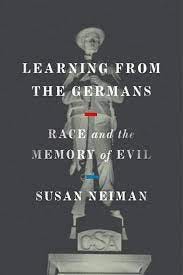Who are these people?
It’s impossible to reconcile that sense of gentleness with the knowledge that more people were lynched here than anywhere else in the country, and lynch is a word that hides more than it shows. They were hacked to pieces, burned to death slowly, fingers and teeth sold as souvenirs to the mobs who drove for miles to witness and jeer. Mississippians’ beloved Jesus, mocked as he hung dying, did not suffer more. It’s hard to square with any definition of gentle I know.
Neiman, Susan. Learning from the Germans: Race and the Memory of Evil (pp. 139-140). Farrar, Straus and Giroux. Kindle Edition.
Neiman is describing the lynching that occurred in Mississippi in the late nineteenth and early twentieth century and I say to myself, “Who are these people who do such things to other human beings?” What is the thought system and value system that contributes to people doing such things to other people? To what extent do these thought and value systems still exist in the US? We still see this kind of brutality today in the cases of Trayvon Martin, George Floyd, Tamir Rice, Breonna Taylor, Ahmaud Aubery, Sandra Bland, Michael Brown, Eric Garner, Freddie Gray, etc.
These situations have been dealt with as if they were cases of "bad apples" rather than part of a pattern of behavior condoned by administrative and political power perpetrated by people voted for office by the citizens of their communities.
When we point the finger at the people in Germany who perpetrated the anti-semitic holocaust, we should remind ourselves of the people of America who continue to support the racist policies and practices targeted toward BIPOC people.
Where does responsibility lie for the continuation of this behavior, attitudes, and values? These behaviors, attitudes, and values are baked into our culture and it is forbidden now in some states such as Florida to even mention it in school and university settings.


